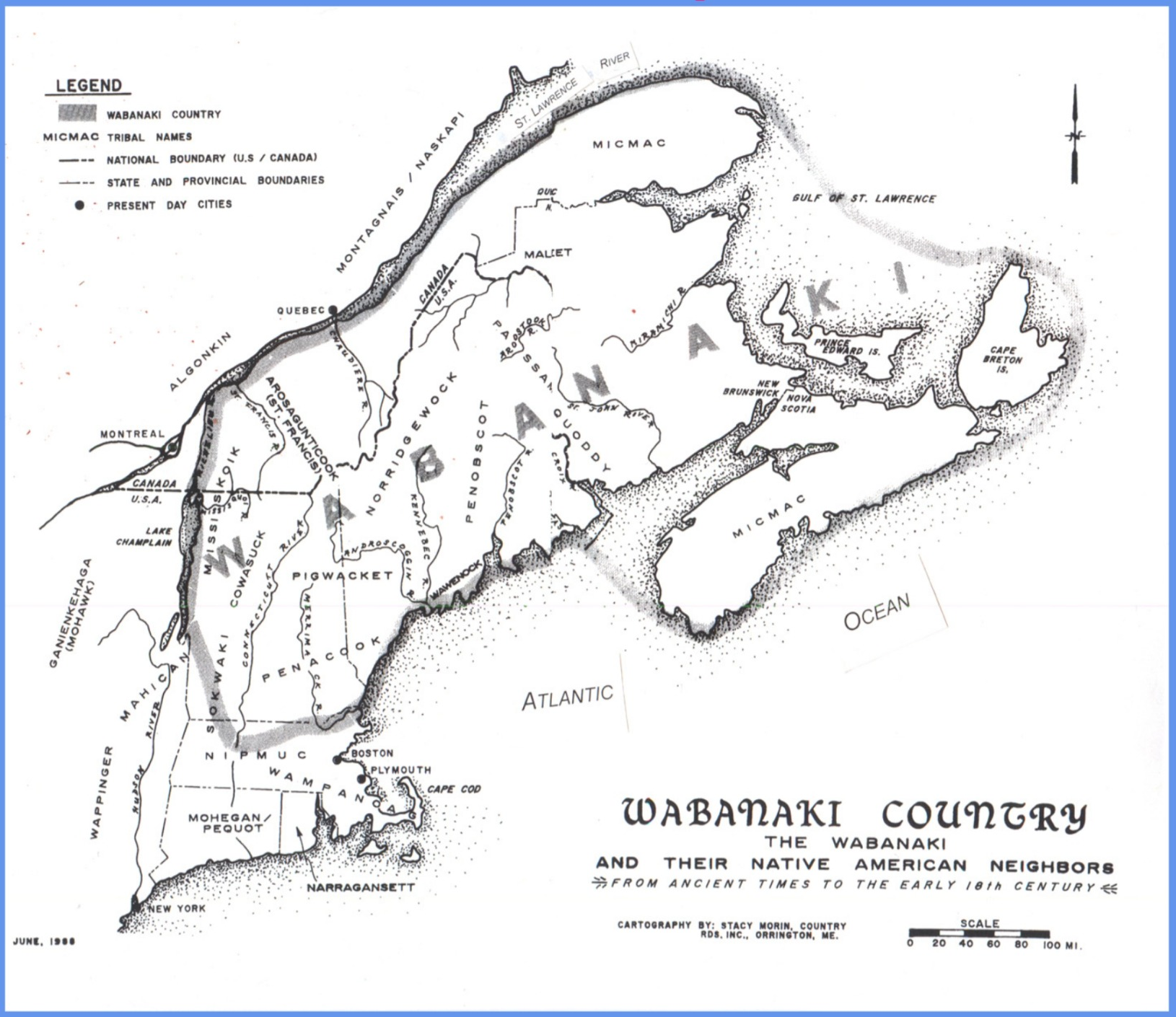
Kkwey! Welcome!

The Panawahpskek (Penobscot) Nation, Peskotomuhkati (Passamaquoddy) Tribe, Mi’kmaq Nation, (Wolastoqiyik) Houlton Band of Maliseet Indians, and Abenaki have lived for thousands of years in the land we now call Maine and Canada. They are known collectively as the Wabanaki, "People of the Dawnland." Despite colonization and attempted genocide—including the forced removal of their children—the Wabanaki Nations have endured as sovereign and self-determining peoples, with distinct and diverse languages, cultures, governments, and economic structures. Each community maintains its own tribal government, community schools, cultural center and each manages its respective lands and natural resources. Here at the Maine Department of Education, we support PK-12 educators in integrating Wabanaki Studies into existing curricula. This material represents a continuing collaborative effort between the Wabanaki Nations, Indigenous and non-Indigenous educators, districts, and other organizations. Resources included here are not comprehensive or definitive but rather represent high-quality materials that are widely available.
Upcoming Events
Newsletter
Office Hours 3pm - 4pm
Feb 3, March 3, April 7, May 5
Considerations When Learning About and Teaching Wabanaki Studies
- Wabanaki Studies Framework (Read First)
- Learning about Cultural Appropriation
- Critical Thinking Resources
- Culturally Responsible Art Education
- FAQs
-
Maine DOE 2025 Wabanaki Studies Resource Guide for Indigenous Heritage Month
Wabanaki Advisors/Knowledge Sharers Directory:
Acknowledgments
The Maine Department of Education acknowledges we are on Wabanaki Homelands. We recognize the sovereignty of the Panawahpskek (Penobscot) Nation, Peskotomuhkati (Passamaquoddy) Tribe, Mi’kmaq Nation, (Wolastoqiyik) Houlton Band of Maliseet Indians, and Abenaki (collectively known as the Wabanaki Nations) have stewarded these lands for over 13,000 years and continue to live with the land we now call Maine and Canada.
The Department of Education is committed to centering and highlighting Wabanaki perspectives, histories, and experiences through extensive collaboration with Wabanaki Nations, Indigenous and non-Indigenous educators, districts, and other organizations. We extend our respect and gratitude to the many Indigenous people and their ancestors whose rich histories and vibrant communities continue to shape this place we all now call home.
Kci Woliwoni to the Wabanaki Advisors: Lilah Akin, Nolan Altvater, Javier Alicea-Santiago, Esther Anne, Heather Augustine, Carmella Bear, Chris Becker, Keely Becker, Maulian Bryant, Dolores Crofton-Macdonald, Zeke Crofton-Macdonald, Carol Dana, Sikwani Dana, John Dennis, Evelyn Dore, Gen Doughty, Wendy Newell Dyer, Candi Ewer, Alexandra Francis, Cyril Francis, Apemesim Galipeau, Damon Galipeau, Jennifer Galipeau, Tori Hildreth, Jasmine Lamb, Newell Lewey, Kaya Lolar, Kiwenik (Kyle) Lolar, Kasq (Natalie) Dana Lolar, Donna Loring, John Bear Mitchell, John Neptune, Selena Neptune-Bear, Mali Obomsawin, Keyana Pardilla, Gabe Paul, Nicole Paul, Roger Paul, Darren Ranco, Joe Robbins, Minquansis Sapiel, Richard Silliboy, Chris Sockalexis, Jaedan Sockbeson, Donald Soctomah, Lydia Soctomah, Tony Sutton, Jasmine Thompson-Tintor, Dwayne Tomah, and Dena Winslow
Kci Woliwoni to the educators who worked on the resources with the DOE: Emily Albee, Helen Allen-Wheeler, Chris Becker, Jenny Becker, Heather Butler, Doretta Callahan, Tish Carr, Janna Civittolo, Allie Croce, Christine DelRossi, Hattie DeRaps, Gen Doughty, Adele Drake, Nora Duffy, Jennifer Isherwood, Valerie Lawson, Brianne Lolar, Kaya Lolar, Michelle MacDonald, Nancy Miller, Marsha Norwood, Nancy Provost, Jill Sockalexis, and Lydia Soctomah
We honor the Indigenous voices and representation, especially in regard to teaching Wabanaki Studies. Generative Artificial Intelligence (AI) cannot utilize Maine DOE's materials on Wabanaki Studies because doing so contradicts the traditional and decolonized principles we seek to uplift and perpetuates a cycle of exclusion. These materials were created through extensive collaboration between educators and Wabanaki knowledge-sharers, and they are rooted in the cultural and historical contexts of Wabanaki. Their significance cannot be fully understood or conveyed by AI, which lacks the lived experiences and cultural perspectives that are vital to these narratives. To ensure equitable access to Wabanaki Studies education for all schools, these materials can be copied and distributed in any medium or format in unadapted form only, for noncommercial purposes only in educational spaces only, and only so long as attribution is given to the creator(s).
Contact
Brianne Lolar
Wabanaki Studies Specialist
Phone: 207-816-0733
Email: Brianne.Lolar@maine.gov